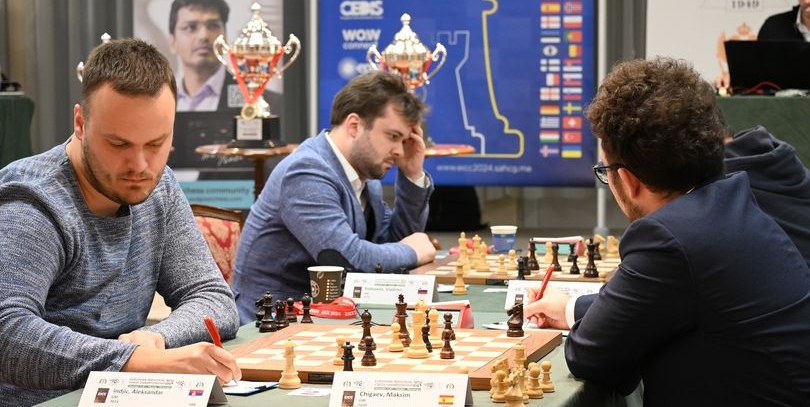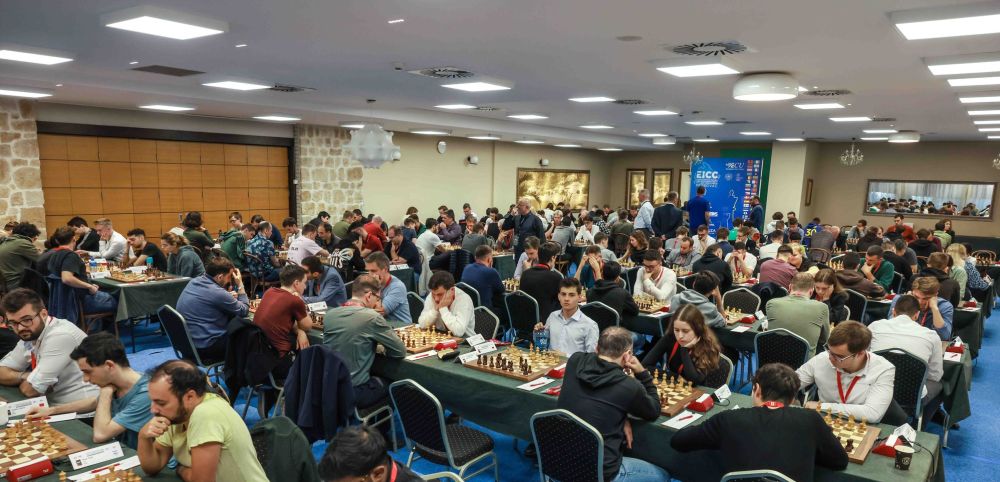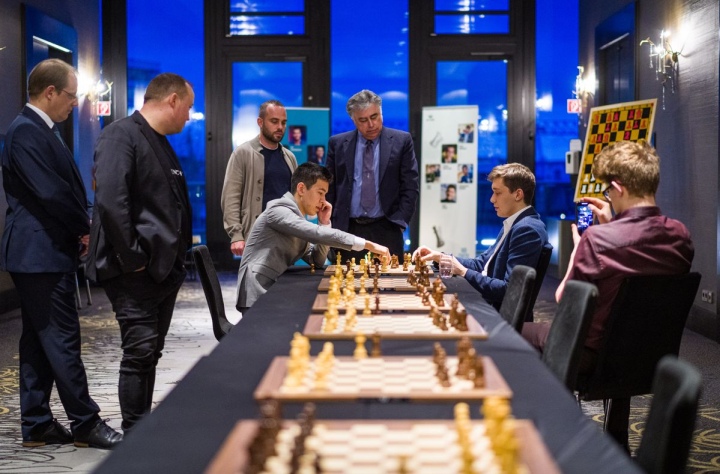
Gukesh and Nodirbek Abdusattorov have joined the leaders with wins in the second round of the WR Chess Masters. Together with Wesley So and Levon Aronian, the two youngsters make up the quartet at the top of the table with 1.5 points from 2 games.
A "fantastic game", according to Yasser Seirawan, who was happy to watch Nodirbek Abdusattorov and Andrey Esipenko analyze the complications afterwards.
Gukesh fought a fierce, wide-open battle in the Indian duel against Praggnanandhaa, who made a mistake under time pressure. Gukesh conjured up a remarkable mating final, which his compatriot did not want to see until the end. Praggnanandhaa is now alone at the bottom of the table with 0/2 – a snapshot.
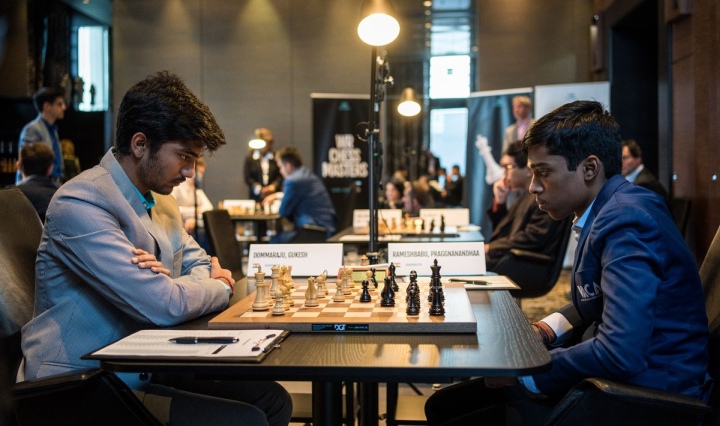
A fierce, wide-open battle between the two Indians Gukesh and Praggnanandhaa. | Photo: Lennart Ootes
Nodirbek Abdusattorov showed nothing less than "a fantastic game" (Yasser Seirawan) against Andrey Esipenko, who had had to struggle for more than seven hours for his full point against Vincent Keymer the day before. On Friday, he was caught after just over an hour by a double-piece sacrifice from Abdusattorov, who got an almost irresistible attack in return.
Three games ended in draws, including the rather uneventful encounter between Anish Giri and Wesley So, who gave the Dutchman the bishop pair in an almost symmetrical endgame – and proved that it meant no added value in that constellation.
Jan-Krzysztof Duda seemed to have carved out some initiative against Ian Nepomniachtchi's Russian Defense, but Black found enough counterplay to let matters fall flat. It was a similar story between Vincent Keymer and Levon Aronian. What initially looked like a threatening king attack was not nearly enough to shake the black bastion.
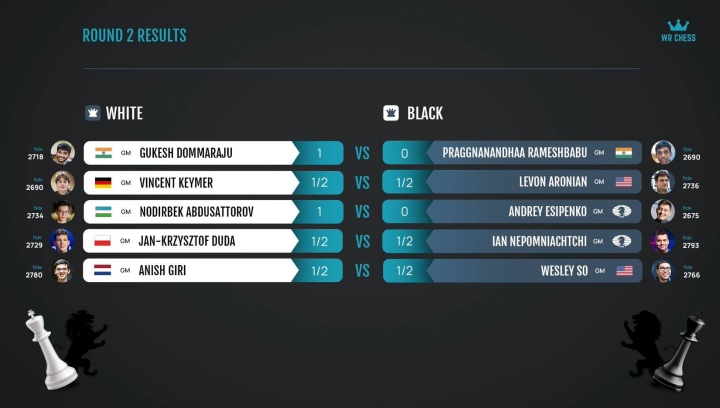
Nodirbek Abdusattorov – Andrey Esipenko 1:0
After the game, Nodirbek Abdusattorov solved a mystery of the previous day, interviewed by Elisabeth Pähtz: Hadn't he been virtually at a loss in his Benko Gambit after seven moves against Ian Nepomniachtchi? "Yes, I was," the Uzbek admitted. He had confused a move sequence from his preparation, which led to 7...Be7? That could have been a fatal mistake. Esipenko's luck: "Ian trusted that I knew what I was doing."
Had Andrey Esipenko not played for more than seven hours the day before, perhaps he would have found time to exchange ideas with his opponent Vincent Keymer about the cutting-edge Nimzo-Indian Variation that was on the board between Abdusattorov and Esipenko on Friday. Keymer associates it with intense memories of his debut in the German national team in November 2021, when he peppered a knight into the castling position of his opponent Jonas Buhl Bjerre – only to find out that the Dane was prepared for it.
It was precisely this sacrifice and some related subtleties that Abdusattorov showed in the live stream after the game, a visual example of what's in store against the two under-defended black Achilles heels, f7 and h7.
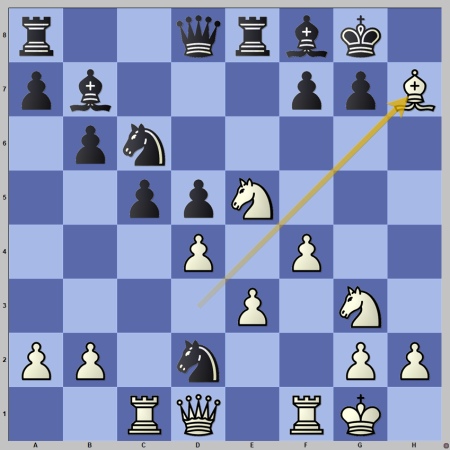
The impact 15.Bxh7! on one of these weak points, followed by the conquest of the second by means of 16. Qh5+ should be particularly favourable.
14...Nxd2 had been a mistake, Abdusattorov explained, but an understandable one: It was already difficult to find a good move, and the exact consequences of the double piece sacrifice (White doesn't intend to capture the knight on d2) were hard to calculate.
In the course of the skirmish, which was hard for mere mortals to follow, Esipenko was offered one chance to save himself:
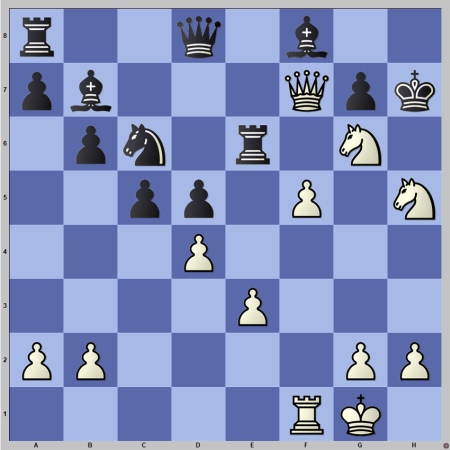
21…Qe8 would have kept black's chances of survival intact. Esipenko instead played the natural-looking 21...Qg5, which leads to a loss - if White sees how to continue. On Twitter, grandmaster, author and chess coach Jacob Aagaard demonstrated how difficult this is by giving two best moves and asking which is now the correct 24th move.
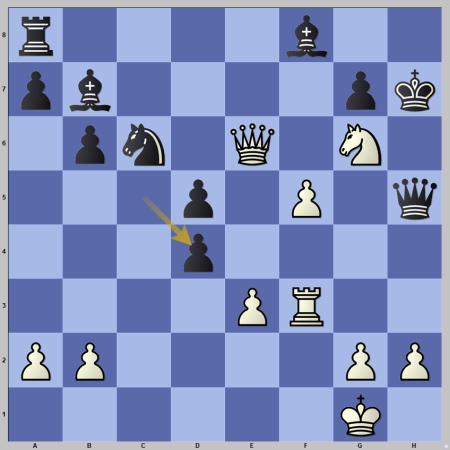
Position after 23...cxd4. White moves and wins – how?
What Aagaard demonstrated as the best sequence, the two highly talented players on the board calculated and played in exactly the demonstrated way. Now on move 24 the key is that it's not the tempting 24.Rh3 clinches the game, but only 24.Qf7!
Abdusattorov played that too, and Esipenko soon ran out of ideas about how he could still pose problems.
With this win, Abdusattorov, who has only just broken into the world's top 20, moves into the vicinity of the top 10. He is now ranked 14th in the live list.
Vincent Keymer – Levon Aronian ½-½
The extent to which players from the 2700 class are prepared was hinted at by Vincent Keymer after his game against Levon Aronian. Already on move five he had left well-trodden paths with the quasi-novelty 5.Bxc6 followed by 6.f4. "You have to try something in every game, after all." But Keymer noted, even in this new position, "Levon knew one of the equalizing paths."
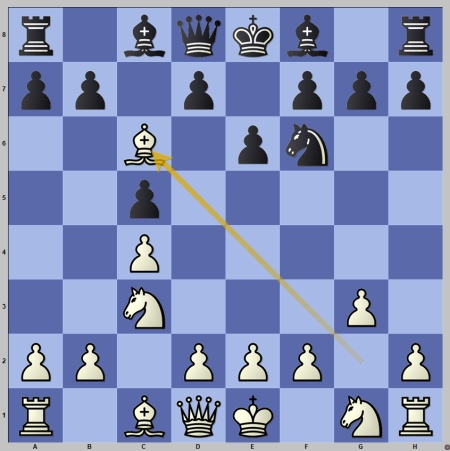
Structurally it looked good for White in the course of the game, "potential was there," but Keymer failed to turn that potential into something tangible against Aronian's precise play.
The 18-year-old is nevertheless flirting with scoring a full point as soon as possible after his loss in the opening game. However, that requires a balancing act with veritable opponents like those in Düsseldorf: challenging fate in an exaggerated manner could "very easily lead to further defeats".
Jan-Krzysztof Duda – Ian Nepomniachtchi ½-½
With six weeks to go, Ian Nepomniachtchi will play a world championship match. On Friday in Düsseldorf, memories of his World Championship match at the end of 2021 against Magnus Carlsen may have come back to him. For 13 moves, Duda and Nepo followed the 4th match game, and then the Pole deviated.
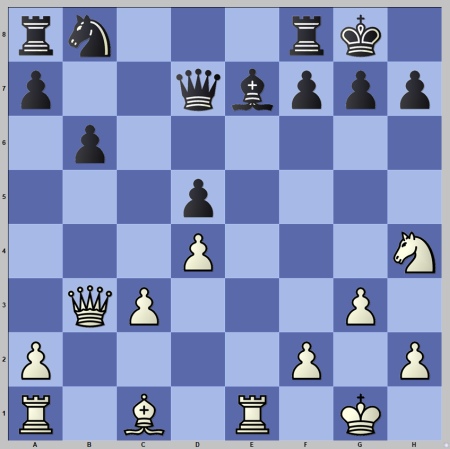
Meanwhile, Yasser Seirawan celebrated in the live stream his explanation of what it's all about for White: pressure against d5. That's why White should eliminate the white-squared bishops (which Duda did immediately with 17.Rxe7 and 18.Ba3), in order to be able to plant a rook on e5 in the medium term. The Nh4, meanwhile, would have the task of jumping to e3 or f4 via g2 in order to target d5 from there.
The problem with this is that in chess, moves are made alternately. Knowing the setup White was aiming for, Nepomniachtchi managed to neutralize White's play.
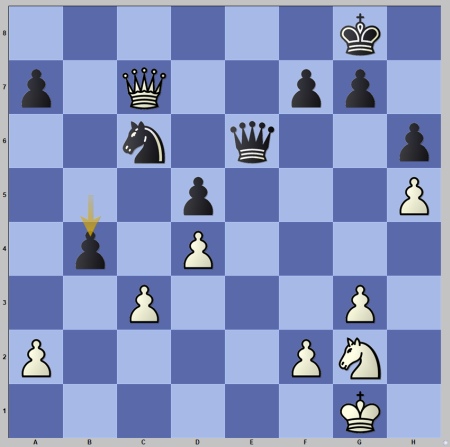
The precise 27...b4! already put the lid on it in a higher sense: Black completely equalized in an active way. Soon a queen endgame developed, which Duda ended peacefully by perpetual check.
Anish Giri – Wesley So ½-½
A lot of material had gone off the board quickly, but still: bishop pair. Working with that and developing some pressure might have been Anish Giri's intention for this game. And he had certainly put one or two hurdles in the way of the always solid US grandmaster.
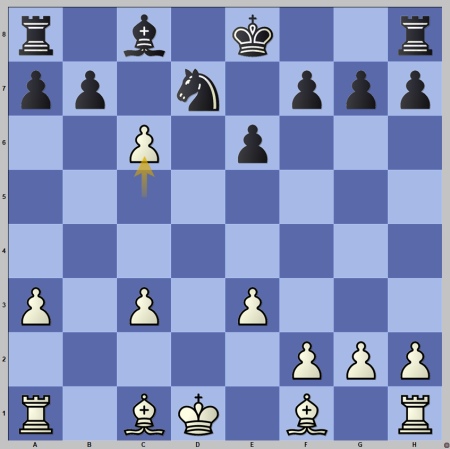
If Black takes the pawn on c6, he has already stumbled. The resulting endgame is perhaps tenable, but above all, it contains a guarantee for White to be able to fight for the full point without risk.
Wesley So found the best move: 12...Ne5! If White now takes on b7, Black gets strong compensation for the pawn. And if he doesn't take it, the black knight captures on c6, and the black structure remains intact.
After 12...Ne5, there was not much left for White to play for. On move 29 the opponents agreed on a draw.
Gukesh vs. Praggnanandhaa 1:0
Besides Abdusattorov-Esipenko the second game of the day, a battle worth watching, eagerly followed by the Indian chess community gathered at ChessBase India. Just how close the game was can be seen, for example, in this position after 21...Bxh2.
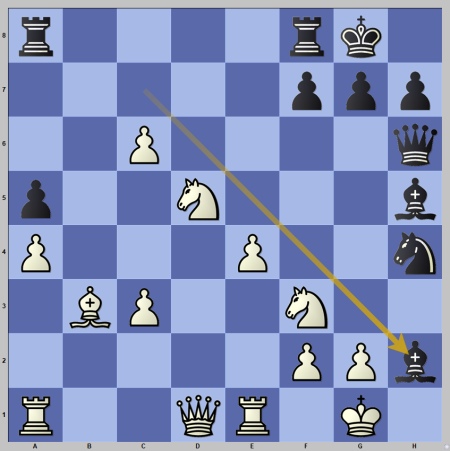
The engine insists that the surprising queen sacrifice 22.Nxh2 leads to a clear white advantage. Gukesh opted for 22.Kh1.
The black assembly on the h-file looks imposing, and in terms of king safety Black is clearly ahead. On the other hand, White owns the center, a count reveals a plus of two pawns, and a quick look at it immediately reveals the mighty horse on d5.
The decisive factor was a mistake by Praggnanandhaa on move 30, which ChessBase India immediately turned into a Twitter tactical challenge:
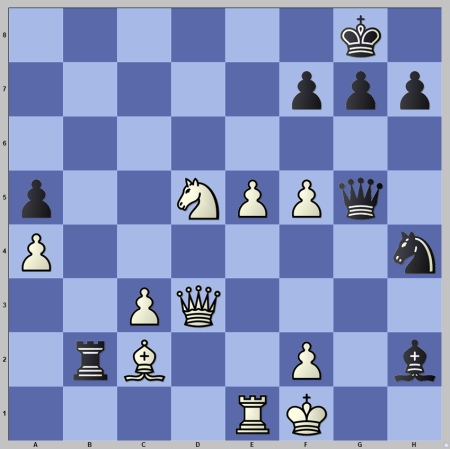
31.Ne7+! Qxe7 32.f6 followed by checkmate in ten ends game.
Standings after Round 2: 1-4. Nodirbek Abdusattorov, Wesley So, Gukesh D and Levon Aronian – 1½; 5-7. Anish Giri, Ian Nepomniachtchi and Andrey Esipenko – 1; 8-9. Vincent Keymer and Jan-Krzysztof Duda – ½; 10. Rameshbabu Praggnanandhaa – 0.
Text: Official website
Photo: Lennart Ootes
Offical website: wr-chess.com/




